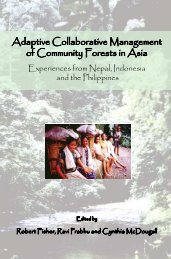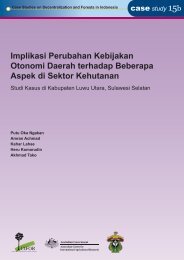Where the power lies: multiple stakeholder politics over natural ...
Where the power lies: multiple stakeholder politics over natural ...
Where the power lies: multiple stakeholder politics over natural ...
You also want an ePaper? Increase the reach of your titles
YUMPU automatically turns print PDFs into web optimized ePapers that Google loves.
eekeeping or thatch grass harvesting. In follow-up meetings with o<strong>the</strong>r <strong>stakeholder</strong>s,<br />
<strong>the</strong> confusion <strong>over</strong> <strong>the</strong> role of CIFOR appears widespread, including among <strong>the</strong> Forestry<br />
Commission respondents who were introducing CIFOR to <strong>the</strong> area. That <strong>the</strong> FC should<br />
publicly acknowledge its own ignorance of what CIFOR is doing actually works in CIFOR’s<br />
favour as <strong>the</strong>y would not necessarily be associated or linked with <strong>the</strong> FC. However <strong>the</strong><br />
fact that FC introduced CIFOR, to <strong>the</strong> area suggested closer lines. Respondents suggest<br />
that many <strong>stakeholder</strong>s are beginning to see a disassociation between <strong>the</strong> two<br />
<strong>stakeholder</strong>s. One g<strong>over</strong>nment respondent questioned why <strong>the</strong> Forestry Commission<br />
that was meant to be CIFOR’s partner were trying to dissociate <strong>the</strong>mselves from CIFOR<br />
or appearing not to understand <strong>the</strong> purpose of CIFOR’s work in <strong>the</strong> area. Thus <strong>the</strong><br />
respondent states that<br />
“For <strong>the</strong> Forestry Commission to get to a point where <strong>the</strong>y are saying <strong>the</strong>y don’t<br />
know CIFOR and <strong>the</strong>y say <strong>the</strong>y don’t know what CIFOR are doing; this situation is<br />
similar to when a mo<strong>the</strong>r rejects its own child. This is unheard of. I can only say this<br />
means <strong>the</strong>re is something wrong with CIFOR and Forestry Commission relationship,<br />
<strong>the</strong>re is definitely something <strong>the</strong>re”.<br />
Ano<strong>the</strong>r official, attributed <strong>the</strong> ignorance by Forestry Commission staff to <strong>the</strong> fact that<br />
projects signed at head office often are imposed on local stuff without much consultation.<br />
However, at present being introduced by <strong>the</strong> FC tends to link CIFOR to <strong>the</strong> FC, and<br />
<strong>the</strong>refore ascribes certain FC characteristics to CIFOR. Until, <strong>stakeholder</strong>s are clear about<br />
CIFOR’s activities or until <strong>the</strong> relationship between CIFOR and FC is clarified this type of<br />
confused identity can influence project activities.<br />
Village respondents also confirmed <strong>the</strong> confusion <strong>over</strong> CIFOR activities thus: ‘we don’t<br />
know which corner CIFOR are coming through because <strong>the</strong>y don’t want to come out in<br />
<strong>the</strong> open.’ The suspicion being directed towards CIFOR is not unique but reflects <strong>the</strong> ageold<br />
habits of people who have been forced <strong>over</strong> time to be cautious of any externally<br />
packaged village research projects. Such comments are important in this project formative<br />
phase. CIFOR needs to explain clearly what its role and purpose will be. In <strong>the</strong> words of<br />
a villager; ‘<strong>the</strong>y must clarify <strong>the</strong>ir position and explain what <strong>the</strong>ir role is, at <strong>the</strong> moment<br />
we don’t know how participatory <strong>the</strong>y are.’ Fur<strong>the</strong>r, CIFOR will need to clarify <strong>the</strong>ir<br />
research ethics as people believe that researchers are extractive, i.e. ‘research<br />
organizations take <strong>the</strong>ir results and go away and never return.’ As CIFOR starts its<br />
project, <strong>the</strong>re will be a need for confidence building with <strong>the</strong> local people and o<strong>the</strong>r<br />
organizations.<br />
Relations between villages in Batanayi RMC<br />
In general, positions in <strong>the</strong> committees are monopolised by members from one village<br />
(Figure 1.2). People from Mrembwe village hold <strong>the</strong> key positions. Respondents note<br />
that <strong>the</strong>se individuals, i.e. <strong>the</strong> chairperson and <strong>the</strong> treasurer often make decisions<br />
without consulting <strong>the</strong> whole committee. Few individuals on <strong>the</strong> committee are rarely<br />
challenged because meetings are infrequent and far between. Closer analysis of <strong>the</strong><br />
subcommittees also shows that members of <strong>the</strong> elite family in one village—Mrembwe—<br />
dominate most RMC committees (Figure 1.1). Out of <strong>the</strong> discussions of networks of<br />
relations we identified <strong>the</strong> most influential person in <strong>the</strong> community as <strong>the</strong> wife of<br />
traditional leader of Mrembwe village (Figure 1.2). Compared to o<strong>the</strong>r women in her<br />
area, this woman holds many positions. She is <strong>the</strong> most vocal woman in <strong>the</strong> study area.<br />
15

















